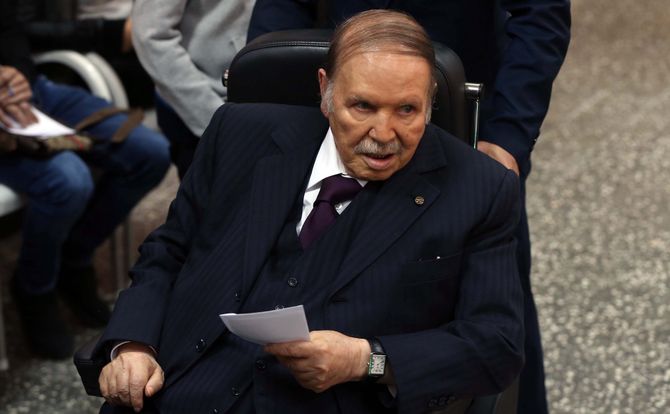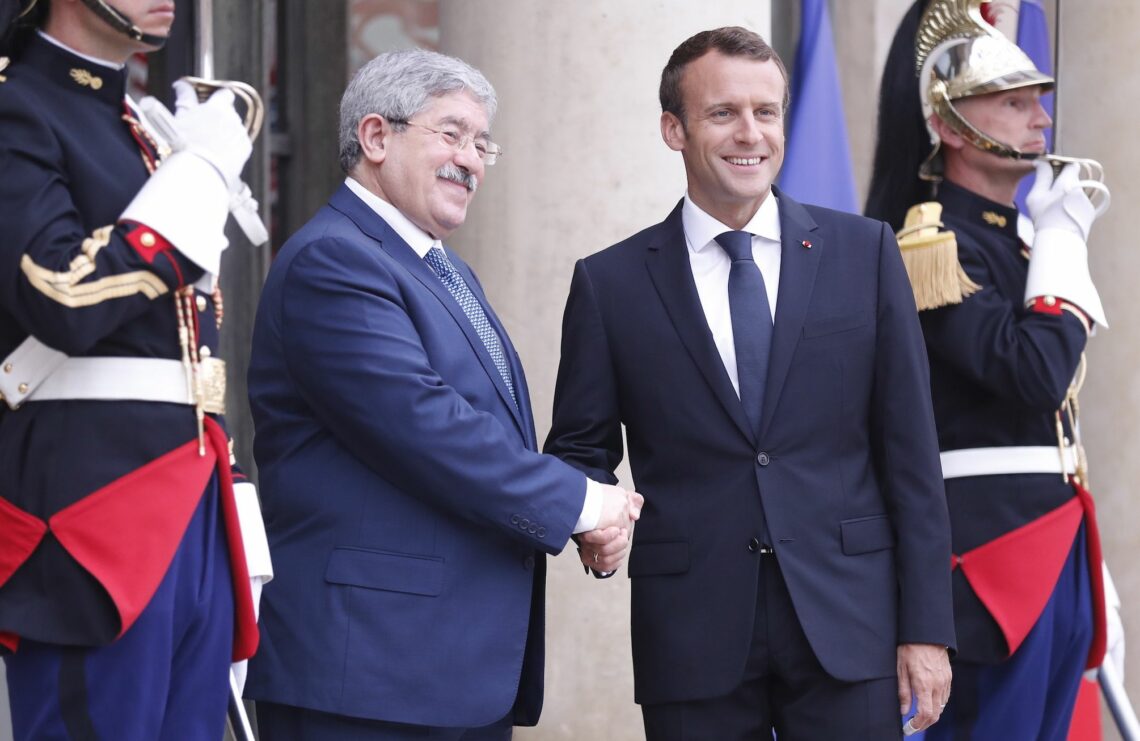Algeria after Bouteflika
After two decades under the leadership of President Bouteflika, Algeria will face several challenges when he leaves office. The new era will come at a time when Algeria’s economic, energy, and security situations are in transition. As the country is an important actor in terrorism and migration, the aftermath will be closely watched in Europe.

In a nutshell
- With longtime president Abdelaziz Bouteflika now 81 years old and in poor health, Algeria is preparing for an uncertain future
- To successfully manage a transition, the ruling elite will need to find a consensus successor
- At stake is Algeria’s economic and political future, as well as the country’s role in the region’s security environment
With ongoing instability in Libya, a social uprising in Tunisia and a delicate political and economic balance in Morocco, the Maghreb is facing a critical period. Challenges to regional stability will increase in the short and medium run as Algeria enters a transition period. While gradual political reforms and economic recovery indicate the possibility of a relatively peaceful transition, a worst-case scenario must still be considered given its profound and far-reaching geopolitical consequences.
Algerian President Abdelaziz Bouteflika, 81 years old and in poor health, has said he will seek a fifth mandate in the 2019 elections. He will likely win the elections but may not be able to lead the country for much longer, given his physical condition. When he does leave, Algeria will face short- and medium-term challenges for which it may not be well-prepared.
Track record
In power since 1999, President Bouteflika has successfully managed two major crises: the end of a civil war and the Arab Spring. Algeria’s single-party system was abolished in 1989. Along with civil liberties, however, the political opening also brought significant social unrest.
In a context of collapsing oil prices, unemployment and corruption, the combination of a political opening with an economic crisis benefited the Islamic Salvation Front (FIS). The group won the first round of the country’s first-ever multiparty parliamentary elections in 1992, taking more than 80 percent of the seats. The country’s military, fearing radicalization and a gradual loss of political power, decided to intervene. The election results were canceled, a state of emergency was declared and several FIS figures were arrested.
Bouteflika is credited with modernizing the state and accommodating political Islam within the governing system.
More than 150,000 people died during the “dark decade” of the Algerian civil war, in which armed Islamist groups opposed a secular military regime. President Bouteflika, who led the country during the last phase of the conflict, was responsible for the final negotiations with Islamists and the implementation of the Civil Concord Law. Mr. Bouteflika is credited with rebuilding a strong and stable state, modernizing the country, deradicalizing religious groups and accommodating political Islam within Algeria’s governing system.
A decade later, Algeria faced the Arab Spring. Contrary to what happened in other Maghreb countries, the Algerian regime managed to demobilize the protests through a combination of social transfers, low levels of targeted repression and a process of relative political opening that included lifting a state of emergency in place since 1992. The memories of the dark decade, still fresh for a significant part of the Algerian population, also explain why the Arab Spring did not spread into Algeria.
Political landscape
Political power in Algeria is concentrated in a mostly closed elite, known as “le pouvoir” (“those in power”). It consists of the ruling circles of the country’s dominant parties – the National Liberation Front (FLN) and the National Rally for Democracy (RND) – plus the military and intelligence services, which are under the control of President Bouteflika and Prime Minister Ahmed Ouyahia.
The Algerian society is relatively depoliticized and mobilized mainly by economic issues. Political tensions mostly occur at the elite level. Although the Algerian regime managed to stabilize the country and improve security conditions since 1999, rivalries between the country’s political and military elites persist. After the Arab Spring, in the name of “deepening the democratic process,” Mr. Bouteflika and his inner circle (the “presidential clan”) consolidated their power vis-a-vis the military.
In 2015, General Mohamed Mediene, a central figure of the regime who had been in charge of the country’s intelligence services since 1990, was removed from his post. Later, Mr. Bouteflika dissolved the powerful Department of Intelligence and Security and replaced it with the Direction of Security Services, an organ that reports directly to the president.

The lack of unified opposition to the Bouteflika regime does not mean that there are not points of tension. In Algeria’s Kabylie region, old feelings of marginalization and secessionist aspirations among the Amazigh (Berber) population have intensified, while in many Algerian cities there have been localized strikes and protests triggered by economic claims.
Politically-organized Islam does not represent a threat to the regime. In the 2017 Parliamentary elections, Islamist parties won only 48 out of 462 seats. However, whereas Islamist parties are losing their appeal, the ultraconservative Salafist movement has been gaining ground with the tacit support of the government. While these movements do not have explicit political aspirations, and though they do collaborate with the regime’s efforts to control religion, their Salafist orientation and radical positioning within Islam may become a challenge under a scenario of political change.
Challenges ahead
A sudden exit of Mr. Bouteflika could substantially aggravate Algeria’s economic and security outlook. The situation is particularly delicate considering that the three pillars of Algeria’s stabilization – the FLN-military alliance, oil and hydrocarbon rents, and the memory of the country’s dark decade – are all, albeit for different reasons, being called into question.
Economically, Algeria is a country with great potential due to its vast area, energy resources (including oil, gas, solar and wind energy) and strategic location. However, the absence of structural reforms, systematically delayed in the name of social stability, compromises its economic performance.
Oil and gas are the foundation of the Algerian economy, accounting for around 25 percent of the gross domestic product, over 95 percent of export revenues and 60 percent of the state budget. Since 2004, however, internal production could no longer keep pace with a fast-rising and largely subsidized domestic demand.
Despite falling government revenues, fiscal prudence and growth in the energy sector are positive signs.
At the same time, a cumbersome bureaucracy, outdated infrastructure and an inadequate legal framework have stunted the country’s growth potential. In 2015, the decline in global oil prices pushed the Algerian regime toward implementing austerity measures. Fearing popular unrest, however, the government began using up financial reserves kept in the country’s Oil and Gas Revenue Regulation Fund since 2000.
The decrease in government revenues poses risks to the regime, yet there are also positive indicators on the economic front, thanks to a combination of fiscal prudence and growth in the oil and gas sectors. The growth rate has slowed down in 2016 and 2017 but remained positive. According to African Development Bank estimates, recovery is expected in 2018 and 2019. Meanwhile, after reaching 15 percent in 2015, the budget deficit dropped to 6.4 percent in 2017. Though the oil and gas fund reserves have been substantially depleted, Algeria’s external debt remains negligible.
Considering that gas prices are on the rise again, Algeria – which is Africa’s biggest natural gas producer and one of Europe’s leading suppliers – is in a favorable position. Also, the Algerian government has recently started to revise the country’s hydrocarbon law, which indicates that there may be some political will to reform the sector.
In security terms, Algeria has Africa’s biggest defense budget, a strong and professionalized army and vast experience in counterterrorism. The country, though, is located in an extremely challenging environment, sharing more than 6,500 miles of porous borders with countries like Mauritania, Mali, Niger, Libya, Tunisia and the disputed territory of Western Sahara.
The Algerian state has managed to substantially reduce the operational capacities of terrorist groups within its territory. It cannot afford to lower its guard, however: al-Qaeda in the Islamic Maghreb (AQIM) is a successor of the Algerian Salafist Group for Preaching and Combat (GSPC), whose forerunner was founded during the civil war. Following al-Qaeda’s logic, AQIM draws a distinction between near enemies: the “apostate” regimes in the Maghreb and the Sahel region, and the far enemy – namely France and the United States.
Most likely, the political and economic reforms already underway will allow for a smooth transition.
Algeria’s geographic position also makes it an important (though often discreet) player in the so-called “migration crisis.” Following the 2016 EU agreement with Turkey and the reinforcement of surveillance along the coasts of Libya and Tunisia, the migrants’ Western Mediterranean route is now under growing pressure. There is also a rising number of migrants from Cameroon, Niger or Guinea who stay in Algeria waiting for an opportunity to reach Europe.
The causes of migration – high demographic growth, lack of economic opportunities, conflict and instability – will remain, and while migrants and potential migrants are expected to adapt to new constraints, they will not give up. Stricter European security measures may mean that more migrants will end up in Algeria, and a scenario of instability in the country could have major consequences across the Mediterranean.
Scenarios
Under the most likely scenario, a combination of political and economic reforms already underway will allow for a relatively quiet, top-down transition process. While the end of President Bouteflika’s rule will be tense, stability will prevail over personal or group ambitions. The “presidential clan” and the military will find a consensus figure to guide the country into the new era. Policies to buy time, including subsidies and social transfers, will gradually be replaced by structural reforms, and economic recovery will contribute to softening their economic and social impact.
In a less likely, but still possible, scenario, the military will again assume control. In a context of instability and unpredictability, the military will present themselves as the sole alternative to chaos and as the most reliable force to neutralize the ambitions of radical Islamists. While in the medium term this scenario would not significantly affect Algeria’s security outlook, the combination of demographic factors (more than 40 percent of the country’s 41 million population is under 25 years old) with the fragilities of a rentier state will negatively impact the country’s prospects in the long run.
A third and rather remote scenario must also be considered, given its potential consequences. In case of a prolonged power vacuum following President Bouteflika’s disappearance, old tensions may reemerge. Protests in urban centers, driven by both economic and political limitations and uprisings in the Kabylie region, would increase, while Islamist groups could become politicized. Irreconcilable differences between the different actors, including the political and military elite, Islamists and a growing urban class, would make a negotiated solution to such a crisis very difficult.
The consequences of the Algerian security apparatus collapsing under political chaos would be far-reaching. Considering Algeria’s role as a police state and a crucial player in containing terrorist and criminal organizations in the region, the deterioration of its security environment would have a significant impact on the Maghreb and Sahel regions, as well as on European countries.







